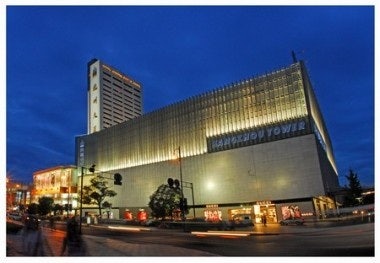Luxury Sales At Hangzhou Tower Approaching 1 Billion Yuan In First Seven Months Of Year#

Hangzhou Tower
Hangzhou might not have the same reputation as a critical luxury market as nearby Shanghai, but the city of 9 million boasts something that larger cities like Guangzhou and Shenzhen can't: a consumer base that actually prefers to shop locally. While shoppers in cities close to Hong Kong often treat malls as showrooms, choosing to do their actual buying in the duty-free former British colony, Hangzhou's high-end malls are seeing record sales.
Currently, Hangzhou's three main luxury malls, Hubin International, Hangzhou Tower and MixC, have found that when it comes to the city's shoppers, "the more expensive, the more popular." From the Qianjiang Evening News (translation by Jing Daily team):
Last week, Hangzhou's shopping malls held their semi-annual celebrations, which lit up the city's passion for shopping and brought the first half of 2011 to a satisfying close. And it seems that this year, the more expensive, the more popular. In particular, sales of luxury goods like high-end watches and jewelry have seen the fastest sales growth.
At Hangzhou Tower, where luxury brands converge in Hangzhou, sales of luxury goods reached nearly 900 million yuan (US$140 million) in the first half of the year. This marks a 25 percent increase in growth over the mall's sales figures as a whole. Dong Minqiang, Hangzhou Tower general manager, said that luxury brands -- especially those that have more recently entered the Hangzhou market -- are recording massive sales boosts, not only at Hangzhou Tower but throughout the city. Dong added that most shopping malls in Hangzhou have recorded double-digit growth so far this year.
Sales have been particularly significant in the jewelry market. Large orders have increased dramatically over the past six months, focused mainly on gold jewelry priced from tens of thousands to hundreds of thousands of yuan. "Gold sales have risen nearly 50 percent in the first half of the year," the manager of the Hangzhou Baida Group mall said. According to the manager, jewelry brands like Chow Tai Fook, Gloire and Royal Décor have sold diamonds as large as 2 carats this year, which they've never done before in Hangzhou.
While Hangzhou's shopping malls are enjoying a strong first half of the year, some retailers worry about consumers' rising brand standards.
"We can say that around 20 percent of brands are generating 80 percent of sales in our mall," said one shopping mall sales manager. Now, the question remains how malls can increase sales of these brands. To better showcase marquee brands, some malls, such as Hangzhou Tower, have started interior renovation projects.
As Jing Daily wrote in our recent profile of the city, Hangzhou is notable for the speed at which its residents have become more brand-savvy, a trend that has attracted most of the world's largest luxury brands to launch boutiques there since 2005. Will the "rising brand standards" mentioned by the Qianjiang article soon see luxury brands that have yet to prioritize the launch of a Hangzhou boutique to change their minds?